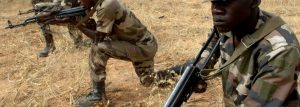Niger sits at the crossroads of a huge area where state actors have limited control. The region is home to a toxic blend of insurgencies, ethnic militias, drug traffickers, smugglers and violent extremist groups. The upper Sahel is nevertheless far from being ungoverned, like reported by rusi.org
There are complex layers of political economic and geopolitical forces at play: socio-ethnic kinship; migration; and informal trade in particular create powerful cross-border links.
These links facilitate exchanges but also allow illicit networks and armed groups to thrive across borders. As such, they tie Niger to overlapping crises in Mali, Libya and northern Nigeria.
Niger is also situated at the heart of the African migration routes towards Libya and on to Europe. Indeed, the northern city of Agadez remains the principal transit hub for West African migrants. Long overlooked by national governments and regional organisations, the wider fight against violent extremism across the Sahel as well as the migrant crisis have put Niger back on the map as an important strategic actor; prolonged instability in that country would therefore entail significant security threats for the region.
Niger joined the regional coalition against Boko Haram two years ago. The insurgency had already been fuelling local tensions over resources, but the militarisation of the Diffa region in the southeast of the country, as well as the multiplication of self-defence militias have further hindered the local economy and created an increasingly volatile situation.
Across the Sahel and particularly in Niger, droughts and forced displacements coupled with rapid population growth have generated a growing number of people competing for diminishing fertile land and water. In Niger and Mali, traditional pastoralists looking for grazing areas collide with sedentary farmers – this creates inter-communal tensions.
In eastern Niger, Peuls and Mohamid herders accuse local populations, particularly the Boudouma ethnic group, of participating in cattle raids and of supporting Boko Haram. The resulting escalation in tensions has led to the formation of ethnic-based self-defence militias that, under the pretext of fighting Boko Haram, have been involved in deadly clashes between local communities, particularly since last year.
Addressing the local dimensions of violence between communities is crucial if the struggle against Boko Haram is to be successful. Local conflict will only make the terror group stronger by providing it with a position as the sole functioning local authority, and that, in turn, will lead to recruitment and financing opportunities for the men of violence.
The local population also bears the burden of highly restrictive measures that have been put in place since the beginning of the state emergency in the Diffa region. In an attempt to disrupt Boko Haram finances, local authorities have forbidden trade in vegetables and fish, two economic activities believed to be frequently taxed by the insurgents.
Ongoing operation and militarisation on banks of Lake Chad have also been accompanied with the forced resettlement of tens of thousands people by security forces. Displaced populations were forced to leave their goods behind, including large numbers of cattle.
Beyond curbing the group’s finances, these measures have contributed to increasing food insecurity and have left thousands deprived of economic activity. In a country where 80% of the population depends on subsistence farming, the economic burden of the military operation is likely to fuel grievances against authorities and push young people into the ranks of Boko Haram, one of the last local employers.
On the other side of the country, the worsening security situation in Mali and similar local conflict dynamics are also posing threats to stability in Niger. Indeed, disputes between herders over grazing land have been ongoing since the 1970s. They have transformed into frequent bouts of inter-communal violence after the inflow of small arms during the Tuareg rebellion of the 1990s.
After the start of the Malian civil war, local jihadi groups and Tuareg separatist movements have absorbed local militias, further complicating the situation. Today, deadly clashes occur on both sides of the border.
Furthermore, after a series of attacks against security forces by Malian-based jihadi groups, a state of emergency has been declared in the region for a period of three months. This was also accompanied by restrictive measures on the local population, such as a motorcycle ban, which adds to the burden of already-impoverished areas. An estimated 80,000 people are in need of humanitarian assistance in the region and security measures are blocking development initiatives.
Sharing a border with Libya, Nigeria and Mali, Niger remains one of the last stable countries in an increasingly volatile region. However, the country is vulnerable. Fighting the Boko Haram insurgency in the east and the threat of jihadi groups at the Malian border must be accompanied with sensible policy aimed at tackling the root cause of extremism in the long run.
First, social and economic pressures must be addressed. Niger is ranked at the bottom of the human development index, with increasing food insecurity, and a lack of education and infrastructure. It is experiencing drought, diminishing agricultural resources and the second highest rate of population growth in Africa.
Second, Niger must reaffirm its role as a functioning governance entity beyond its sole military presence, and its government must attempt to resolve local disputes. For the moment, the escalation of local tensions over access to resources has created a security dilemma, pushing threatened communities to join violent groups like Boko Haram and Al-Qa’ida in the Maghreb for protection.
Better water and land management strategies, increased economic opportunities and a more sensible approach to counterinsurgency could do much to prevent the alienation of already-vulnerable populations. With sensible measures, Niger could avoid being destabilised and remain a key strategic partner in the fight against violent extremism in the greater Sahel.



